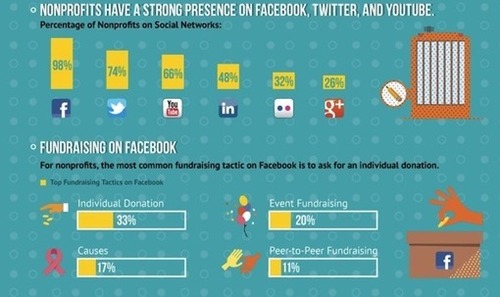Check out on Millennial Trains Project
See on Scoop.it – Social Justice and Media
Check out Millennial Trains Project
Microsoft Study: Employees More Productive With Social Tools Yet Companies Still Block Them (Infographic)
See on Scoop.it – Social Justice and Media
II’ve been thinking lately of corporate America’s social lobotomy. Its disconnect between the wants and the want-nots. According to a recentMicrosoft survey conducted by research firm Ipsos, nearly 50% of employees believe social tools make them more productive while more than 30% of companies restrict the use or undervalue them. For me, this is a form of social malpractice perpetuated by the cold, hard but secure hand of command and control management..
See on www.forbes.com
Non-Profits That are Doin’ it (Social Media) & Doin’ it & Doin’ it Well | Business 2 Community
See on Scoop.it – Social Justice and Media
Social media marketing may seem challenging for any business, even non-profits. But MDG Advertising has created a super informative infographic citing just
See on www.business2community.com
Stunning Laser Scans That Could Help Us Reuse Aging Buildings Better
See on Scoop.it – Urban Planning & the Virtual Space
No, these are not renderings.
See on www.theatlanticcities.com
Why Eye Contact Still Matters In The Age of Email
See on Scoop.it – Social Justice and Media
Eye contact versus a 140-character tweet. Are your kids still learning proper communication skills, or has social media stunted that development?
See on mashable.com
Forrester’s top 10 trends for mobile in 2013
See on Scoop.it – Social Justice and Media
Mobile phones are already well on their way to replacing cameras, cash, maps, remote controls, handheld gaming systems, boarding passes, tickets, cash registers, calculators, notepads, and much more. And they’re becoming globally ubiquitous: 1.6 billion phones were shipped last year; and by the end of this year, 1.4 billion smartphones will be in use.
So the question is not so much what smartphones can do, it’s what can’t they do. And the strategic imperative for organizations is to understand how they are going to meet the challenge of that change.
A week after sharing its vision of the top 15 emerging technologies, Forrester shared its view of the near future of mobile in analyst Thomas Husson’s report, released today.
Here are the top 10 implications for mobile, according to Husson:
This is a challenge and an opportunity for organizations globally. However, there are still people who are not able to afford these seemingly ubiquitous tools. How can we provide the world with equal access to information?
Do people deserve the right to access? or is this something that they should own?
See on venturebeat.com
Storytelling as Volunteer Recruitment (& knowledge) Strategy | Firefighter Nation
See on Scoop.it – Urban Planning & the Virtual Space
Tiger Schmittendorf shares childhood memories of the fire service and emphasizes the value and importance of storytelling as a means of helping firefighters recall and regain their passion for the job.
A tidbit on why storytelling isn’t specifically for fictional writing, how we can include storytelling in all of our writing to enhance the meaning and support a deeper understanding of ethical and moral concepts within a project.
Nonprofits need to capitalize on what makes them stand out from for profit institutions, they are honest about their ethics and run 100% on the energy of that dedication.
See on www.firefighternation.com
College Degree Required by Increasing Number of Companies | NYTimes.com
See on Scoop.it – Social Justice and Media
The college degree is becoming the new high school diploma: the new minimum requirement, albeit an expensive one, for getting even the lowest-level job.
Consider the 45-person law firm of Busch, Slipakoff & Schuh here in Atlanta, a place that has seen tremendous growth in the college-educated population. Like other employers across the country, the firm hires only people with a bachelor’s degree, even for jobs that do not require college-level skills.
This prerequisite applies to everyone, including the receptionist, paralegals, administrative assistants and file clerks. Even the office “runner” — the in-house courier who, for $10 an hour, ferries documents back and forth between the courthouse and the office — went to a four-year school.
“College graduates are just more career-oriented,” said Adam Slipakoff, the firm’s managing partner. “Going to college means they are making a real commitment to their futures. They’re not just looking for a paycheck.”
Click headline to read more–
Just like inflation, this is simply a response to the growing demand for jobs in the market.
The sad part is that a college degree should not bar equally qualified people for these jobs because those degreed individuals are going to be looking for their next promotion within a few months of the hire. Whereas individuals with less job prospects may decide to hold on to their job longer thus saving companies money in training and hiring staff in addition to fostering a healthier corporate culture.
just sayin…
See on www.nytimes.com
What happened on the second screen market in January?
See on Scoop.it – Urban Planning & the Virtual Space
2013 has started quickly on the second screen market with the CES and the second screen summit.
See on blog.mediatvcom.com








